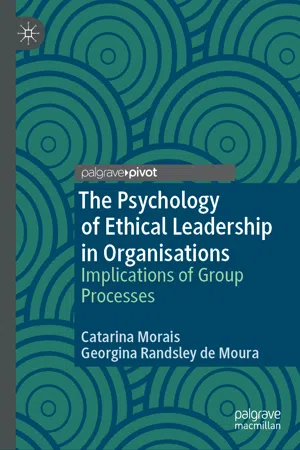Globalisation forced organisations to restructure their views of the job and the way they execute it. This phenomenon explains, at least in part, why groups are formed within organisations, as they became more dependent on groups and teams to complete the different demands. In the current job market, being competent is no longer sufficient, and employers are increasingly looking for employees who are able to work in teams and, ultimately, that have leadership abilities. As such, to understand organisational leadership—including ethical leadership—it is critical to introduce information on how groups make decisions, and how leaders emerge within group. There is a long history in social psychology of understanding whether groups are better than individuals in making decisions, and also into why groups need leaders to be most effective .
In this chapter, we discuss the circumstances under which individuals are better than groups at making decisions, and which factors contribute to increase the quality of group decision-making , as well as how leaders emerge within groups and how they can be effective in order to achieve the organisations ’ goals. This provides a focus on group processes and a critical background into understanding how individuals respond to leaders within organisations—including ethical and unethical leaders.
The Problem of Decision-Making in Groups
People often question whether it is individuals or groups who make better decisions (Davis, 1992). Research is not conclusive, as many different factors come into play. Also, individuals working alone and in groups use cognitive heuristics—like mental shortcuts—and are prone to biases when it comes to making decisions.
One of the main arguments in favour of the superiority of groups in decision-making is related to the fact that, by working in teams , individuals can build on each other’s ideas, correct other’s mistakes and, therefore, increase the quality of the decision-making (Arnold et al., 2010). For example, previous research has shown that employees who work in teams and are exposed to other people’s ideas and diversity have their creativity enhanced, and that, when working in teams, individuals recall more information and make more rational decisions when compared to individuals alone, outperforming them (e.g. Fahr & Irlenbusch, 2011; Martell & Borg, 1993; Masclet, Clombier, Denant-Boemont, & Lohéac, 2009; Michaelson, Watson, & Black, 1989; Paulus, 2000; Vollrath, Sheppard, Hinsz, & Davis, 1989).
The challenge is that, working in groups and making group-based decisions is not perfect. One could easily assume that work teams would be better at freely generating ideas (brainstorming ). However, science has not completely backed up this prediction: on the one hand, previous research has indeed shown that individuals in groups can think up twice as many ideas as they could on their own (Osborn, 1957; cf. also Madsen & Finger, 1978), but, on the other hand, some studies showed that when individuals are stimulated and encouraged to generate as many ideas as they can think of, they can actually produce more ideas per individual than do groups (e.g. Lamm & Trommsdorf, 1973; Mullen, Johnson, & Salas, 1991). Several explanations have been suggested to justify this phenomenon, including production blocking , that is, the possibility of people forgetting or suppressing their own ideas whilst other team members are talking (Diehl & Stroebe, 1987); or that individuals might be afraid of what others think about them when they are exposing their ideas (evaluation apprehension; Diehl & Stroebe, 1987); or simply because they feel and believe that other team members might do the work for them (free-riding , Williams, Harkins, & Latané, 1981).
Another frequent situation that exposes the difficulties of deciding in groups refers to tasks in which there is a correct answer. Under these circumstances, it is not enough for the group to have one member who is capable of finding the solution, as it requires at least two people to convince the remaining members (Arnold et al., 2010). This means that for these types of tasks, groups are, on average, better than individuals but also inferior to the best individuals or, in other words, the group is “as good as its second-best member” (Arnold et al., 2010, p. 503).
Previous research has also shown that groups often do not seek the best solution to a problem and would rather settle for a consensus instead. If the group’s motivations for consensus is stronger than its motivation to carefully evaluate the advantages and disadvantages of a decision, groupthink can result. Therefore, groupthink occurs when individuals’ main concern refers to achieving consensus instead of finding the best available way of solving a problem or situation (Janis, 1982). Moreover, groups can be prone to the s...
